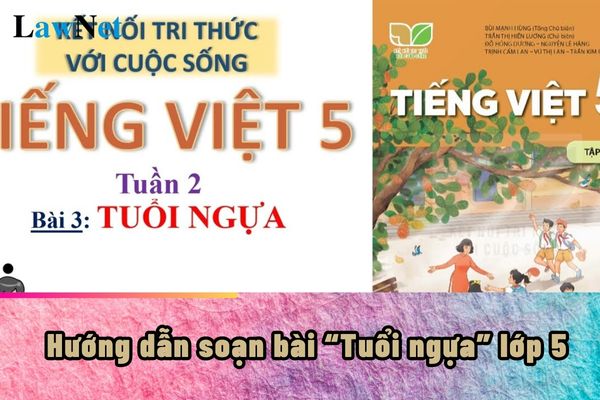Guidelines for preparing the lesson "Tuổi ngựa" for grade 5 students in Vietnam
Guidelines for preparing the lesson "Tuổi ngựa" for grade 5 students in Vietnam
The lesson "Tuổi ngựa" is part of the Vietnamese Language curriculum in the grade 5, introduced in the 2nd week of the academic year.
Below are instructions for preparing the lesson "Tuổi ngựa" to help students easily access and understand the material:
|
Instructions for Preparing Lesson "Tuổi ngựa" for grade 5 students [1] Main Content of the Lesson: |
*Note: Above contents are for reference only./.

Guidelines for preparing the lesson "Tuổi ngựa" for grade 5 students in Vietnam (Image from the Internet)
What are required features when teaching grade 5 Vietnamese Language in Vietnam?
The term Vietnamese Language is used in the primary level; in the lower and upper secondary school levels, it is called Literature.
According to Section I of the Appendix of the Literature Education Program promulgated with Circular 32/2018/TT-BGDDT, teaching Literature in the grade 5 has the following features:
Literature is a subject in the field of Language and Literature Education, taught from 1st to 12th grades. At the primary level, this subject is called Vietnamese Language; at the lower and upper secondary school levels, it is called Literature.
Literature is both an instrumental and an aesthetic-humanistic subject; it provides students with communication tools and forms the basis for studying all other subjects and educational activities in school. Additionally, it is a crucial tool for educating students about the noble values of culture, literature, and the national language; nurturing healthy emotions, humanistic feelings, and altruistic living.
Through the lively verbal texts and artistic images in literary works, along with reading, writing, speaking, and listening activities, Literature plays a significant role in helping students form and develop good qualities and core competencies needed for effective living and lifelong learning.
The content of Literature is comprehensive, encompassing cultural knowledge, ethics, philosophy, etc., and relates to many other subjects and educational activities, such as History, Geography, Art, Civic Education, Foreign Languages, Natural and Social Sciences, Experiential Activities, Vocational Guidance, and so on. Literature is closely related to life, helping students show concern and connection to daily life, relate, and develop skills to solve real-life issues.
The core content of the subject includes essential and basic knowledge and skills in the Vietnamese language and literature, meeting the requirements for students' qualities and competencies at each educational level. It is divided into two phases: the basic education phase and the career-oriented education phase.
Basic education phase: The curriculum is designed around main strands corresponding to reading, writing, speaking, and listening skills. Vietnamese language and literature knowledge is integrated within the teaching of reading, writing, speaking, and listening. Materials are selected and arranged following students' receptive abilities at each educational level.
The goal of this phase is to help students proficiently use Vietnamese for effective communication in life and to excel in other subjects and educational activities; develop literary competence as a manifestation of aesthetic competence; and nurture thoughts and feelings to foster students' souls and characters.
Career-oriented education phase: This phase aims to solidify and enhance the results achieved in the basic education phase, improving students' language and literary competence, especially in understanding literary texts; enhancing skills in creating more complex argumentative and informative texts; equipping students with historical and theoretical literary knowledge helpful for reading and writing about literature; and continuing to nurture thoughts, feelings, souls, and character to become responsible citizens.
Additionally, throughout the year, students inclined towards social sciences and humanities can choose to study a number of specialized topics.
These topics aim to enhance knowledge about literature and language, apply knowledge practically, and meet students' interests, needs, and career orientations.
What is the foundation for developing the grade 5 Vietnamese Language curriculum?
Based on Section II of the Appendix of the Literature Education Program promulgated with Circular 32/2018/TT-BGDDT, the development of the grade 5 Vietnamese Language curriculum must consider the following factors:
The Literature Program adheres to the basic principles outlined in the core program and emphasizes the following perspectives:
[1] The program is built on theoretical and practical foundations, updating achievements in educational science, psychology, and Literature teaching methods; findings in literary and linguistic research; achievements in Vietnamese literature through various periods; experiences in developing the Vietnamese Literature curriculum, notably from the early 21st century to now, and recent international trends in program development, especially from developed nations; considering Vietnam's social, educational realities, economic conditions, and cultural traditions, particularly the diversity of student backgrounds in terms of regions, conditions, and learning abilities.
[2] The program centers on training communication skills (reading, writing, speaking, and listening) as the main axis throughout all three educational levels to meet competency-based program requirements and ensure coherence and continuity across all grades and classes.
Fundamental and foundational general knowledge about the Vietnamese language and literature is formed through the reception and creation of texts; directly serving the training of reading, writing, speaking, and listening skills.
[3] The program is designed with flexibility, indicating essential learning requirements in reading, writing, speaking, and listening for each grade; specifying core knowledge about the Vietnamese language, literature, and some significant and meaningful national literary texts mandatory for all students nationwide.
[4] The program balances innovation requirements and the emphasis on inheriting and promoting the strengths of existing Literature programs, particularly the current one.
DOWNLOAD the Literature Curriculum issued with Circular 32/2018/TT-BGDDT.

